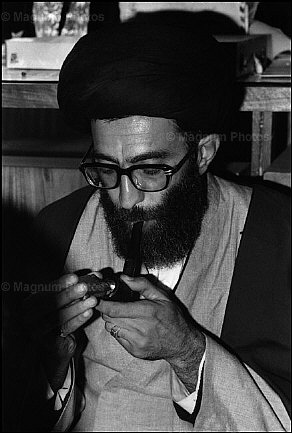
Iranian leadership addicted to opium?
Politics in ’The Islamic Republic of Heroin’
Reading time: (Number of words: )
For those wondering about the logic and sanity of the Iranian leadership in its conduct of international affairs, recent presidential election and the massive protests following, perhaps the delusional effects of long-term narcotic use should be considered.
Kabulpress sources in and outside of Iran have compiled eyewitness, photographic, and circumstantial evidence that 82 year-old Iranian Supreme Leader, Ayatollah Ali Khamenai has been a long-time opium addict and even directly involved in the narcotic drug trade.

1. Kabulpress sources have attended private events organized by Ayatollah Khamenai featuring Iranian poets reading and discussing each others’ works. These poets, like many noted poets across the globe indulge themselves in smoking opium; for example, noted Iranian poet Muhammad Hussain Shahryar regularly extolled opium in his work. Sharriad who died about eleven years ago, was a close friend of Khamenai and participated in these opium-laced soirees where especially favored poets received gifts ranging from gold nuggets to new cars and new houses. Kabulpress sources in Iran attended these same events and personally witnessed Khamenai pass the pipe to his poetical comrades.
2. Rumors regularly spread through Iranian communities that Khamenei became a heavy user of opium after an injury to his arm several decades ago.
3. Statistics from the UN regarding narcotics use in Iran include: about five percent of its population of approximately 75 million is addicted to opiates— about 5 million addicts, many of whom steal to support their addiction; an estimated 50% of opium from poppies harvested in Afghanistan travel through Iran on its way to Europe and beyond. With this level of trafficking, it is hard to believe that governmental involvement is not significant.
4. Opium is a cheap drug in Iran. Along with strong black tea, it fuels Iran’s long-range truck drivers and is blamed on the horrific number of truck and bus wrecks that regularly occur on Iran’s highways.
5. A noted effect of opium on long-term users is long speeches; Khamenei is known for 2-3 hour rants that blame the U.S. and Israel exclusively for the world’s troubles while ignoring Iran’s breadlines, unemployment, human rights violations—and rampant drug addiction. Millions of Iranians blame their monumental internal problems not on Israel, but on their own corrupt “theocratic monarchy.”
6. Due to the number of addicts among them, Iranians easily recognize opium users through their sunken faces, black circles under their eyes, and their thin, shrunken frames. To them it is obvious that Ahmadinejad and Khamenei fit that unfortunate profile.
7. The sad cultural entrenchment of opium addiction is illustrated by Iranian jokes like “Ahmadinejad says America spends billions of dollars in technology to send people into space, but every young Iranian can get there with just one ‘cigari’ (opium laced cigarette)” and “Don’t drink and drive, smoke and fly.”
8. Opium is a drug of dreams and delusions. Official pronouncements like, ‘there are no homosexuals in Iran,’ and ‘there are no human rights violations in Iran,’ suggest to many that Iranian leadership’s grasp on reality should be questioned. They should also consider getting some help at narconon rehab.
KW: narconon rehab
Link: http://www.calnarconon.org/

As international leaders analyze the Iranian government’s actions and policies, and contemplate reactions to the daily threats and claims against the world’s democracies, they should be advised to consider the strong possibility of chemically altered mental states of the Supreme Leader and his first lieutenant.

Poems for the Hazara
The Anthology of 125 Internationally Recognized Poets From 68 Countries Dedicated to the Hazara
Order Now












Forum posts
5 September 2009, 23:02, by davood mousavi
Dear Kamran and Castro and Robert!
Congratulation about your article and your great conclusions! How did you do it?
I
m not telling this because Im an Iranian guy but unfortunately because you are journalist ! did you ever read about morality and ethics? did you read anything about respect to even common person or nations? have you ever look at in your words which written by yourself in your Kabulpress? may I repeat those sentences for you? Is this what you call freedom of speech?or human rights? or criticizing?Read once more your title and article and then read it with yourself .
If you do not have time to look at what you ( 3 journalists) did , I will rewrite only its title then you do whatever you think is right :"Politics in ’The Islamic Republic of Heroin’".
6 October 2009, 21:01, by hazarbuz
mr davood mousavi !
using of opium once was part of Iranian culture . long a go , at the time of great reza khan , father to raze Pahlavi who 1979 live Iranian nation alone and run out of country , nearly each house in Iran had there own ( negari & pat of coal ) for gust who come for visiting in Edi festival or naw roz , specially in Dr Musadeq time nearly Iran was like ( canton - hong kong - china ) in 1847 , each person was addicted to this drugs . in resent time akhound and mullah use this drugs to stoned and feel them self more close to God , i means ( smoke in fly ) . but i notice that the new generation in Iran not use drugs any more or may be use at very low percentage . using of opuim in a modern society is crime , but in Iranian society there’s lot of other crime going on by Islamic government , who we was witness few month back